Tag: Olgapuri Vocational School
Purposeful Living & Olga Murray: A Celebration and an Invitation
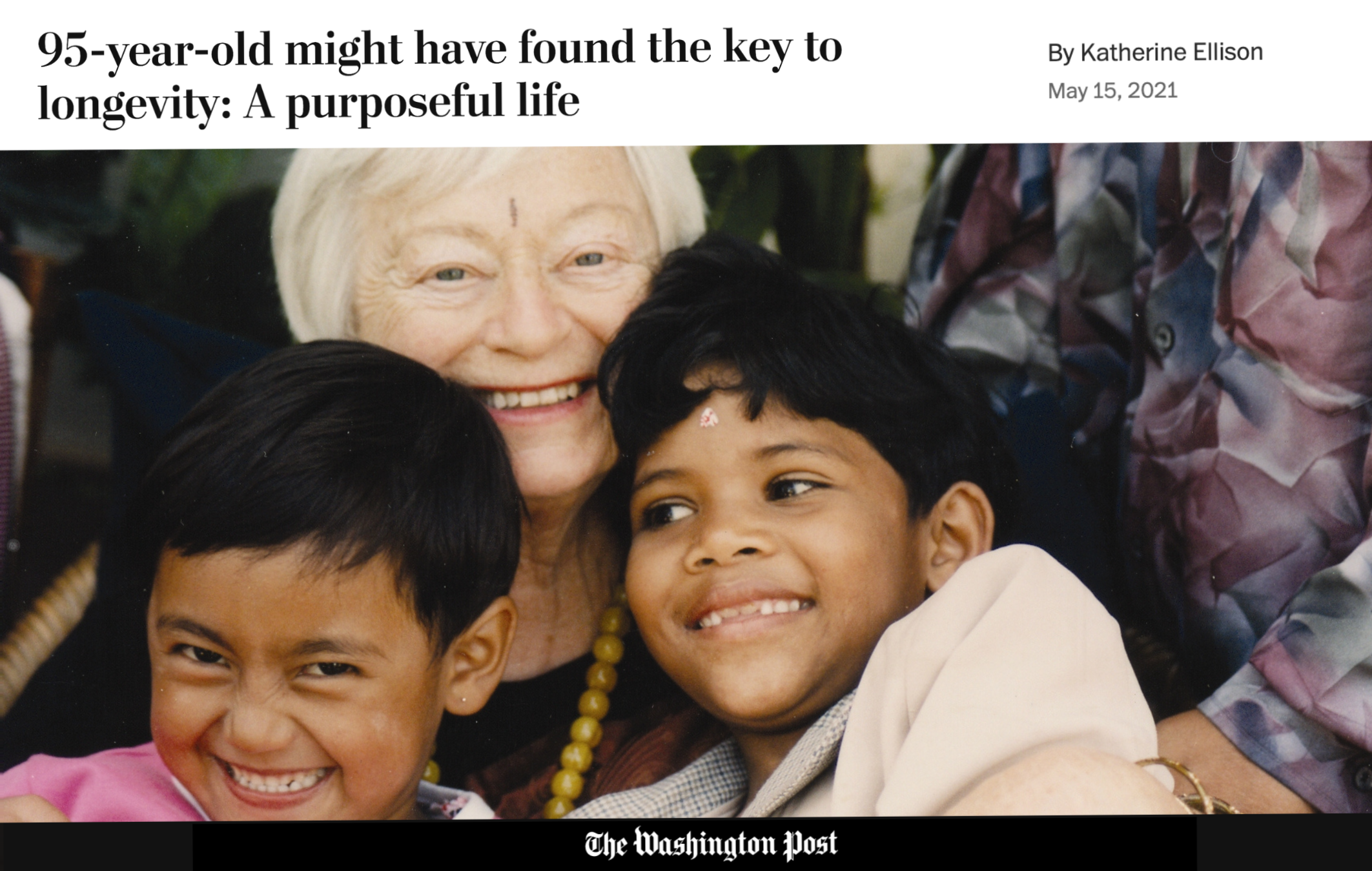
Purposeful living is the focus of a new Washington Post article about our very own founder, Olga Murray (click the link to open the article in a new tab – it is a beautiful tribute by Pulitzer-Prize winner Katherine Ellison!). Our beloved Olga, on the cusp of her 96th birthday, has been an inspiration during the past year of lockdowns and uncertainty.
‘ “I’m not a doctor,” ‘ the article quotes Olga during a recent interview, ‘ “but I do know that when I get out of bed every morning and think that I might help a little kid in Nepal, I’m not focused on my body… My main focus is on the kids.”
In her interview, Olga is characteristically modest. So much of Olga’s work is driven by her belief in others. She believes in those she partners with at NYF, like President Som Paneru. She believes in her friends, her connections – all those generous donors who make her work possible. Most of all, she believes in the children of Nepal, and in the incredible things they can accomplish if given the proper opportunities. (Bishnu Chaudhary, the young woman freed from domestic slavery who recently passed the Nepalese bar exam, is just one example!)
Even with purposeful living fueling her longevity, “I’m not going to be around forever,” Olga says pragmatically. “And the thing I want most in the world is for this program to go on.”
The NYF community is determined to make that wish come true.
If you’d like to learn more (and to see Olga Murray live over Zoom!), click here to register for our upcoming virtual Founder’s Day celebration! Join NYF’s email list here.
To support NYF’s mission during this challenging time – bringing Education, Health, Shelter, and Freedom to Nepali children – please donate here. For more powerful impact, consider making yours a monthly donation!
SAAET Project: Lockdown inspires new growth for young women in Nepal
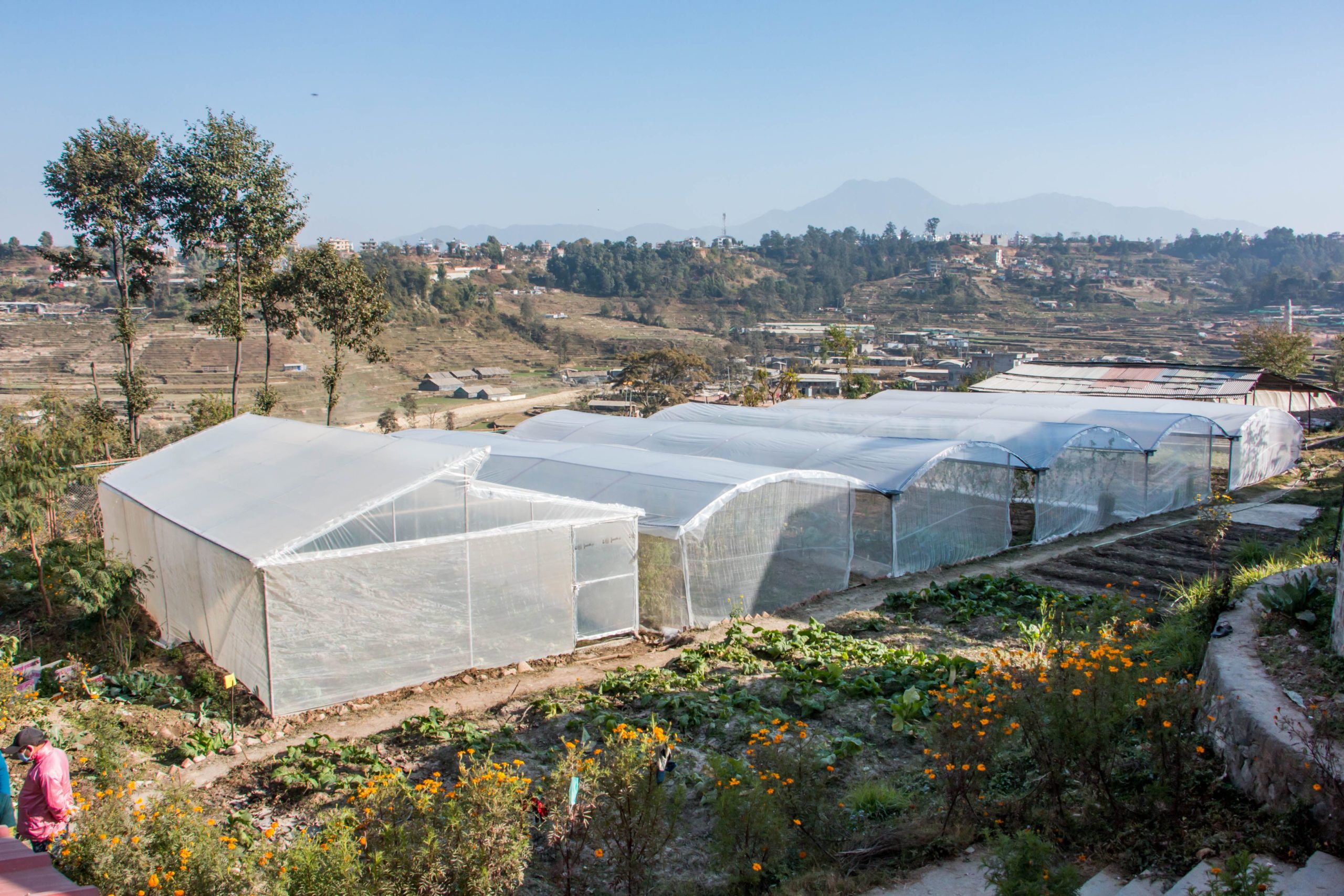
A letter from President Som Paneru
Dear NYF friends and family,
One year ago, just before the pandemic began, NYF was working to engage more women in our vocational education programs. We had seen that most of the young people interested in coming to Olgapuri Vocational School were young men—no matter how hard we tried to encourage young women to apply.
We reached out to families and learned that many young women were anxious about living near a big city like Kathmandu. Others insisted that even if they learned the skills offered—carpentry, plumbing, welding, and electrical—the pervasive culture of workplace sexism in Nepal would ensure they never truly advanced in a career. To these young women, the risks associated with these career goals were simply too great. As we worked to design an enriched program especially for them, the pandemic arrived. Olgapuri Vocational School was forced to shut its doors until further notice.
That is when the pandemic forced us to look at the problem differently.
During the lockdown, a generous donor helped us begin building a beautiful group of greenhouses on the Olgapuri grounds. As I oversaw the progress, I wondered—could we design a pandemic-safe vocational education program for young women that could bring greenhouse technology and training to their villages?
Greenhouses are relatively inexpensive to build and maintain, and can provide an enormous economic benefit to women in rural communities.
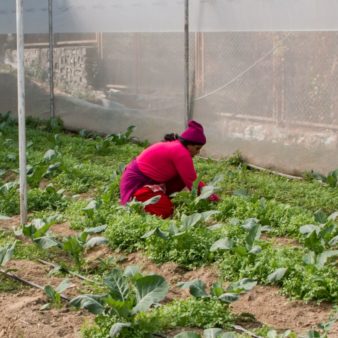
This is how the new SAAET Project was born. Saaet means “an auspicious moment of starting a new journey” – and it stands for Sustainable Agricultural and Entrepreneur Training.
Starting this spring, our greenhouse trainer will travel to rural villages to quarantine and then provide hands-on training to classes of 20 young women each. Students will learn the basics of organic farming, nursery techniques, construction and use of plastic greenhouse and drip irrigation, budgeting, bookkeeping, and more. By the end of the training, each woman will be prepared to manage her own greenhouse—feeding herself and her family with nutrient-rich vegetables, and often making extra income, even during a crisis.
Including the start-up materials for each girl’s fully-functional greenhouse, the project’s cost per village is $7,500. In our first year, we hope to bring the SAAET Project to five villages—or 100 young female entrepreneurs.
I am so grateful for the loving support that has made this project possible during an unprecedented crisis. Your gifts are helping Nepalese young people build towards better health and brighter futures.
Dhanyabad,

Som Paneru
President
Maghe Sankranti, NYF and Freed Kamlaris Celebrate 20-Year Journey
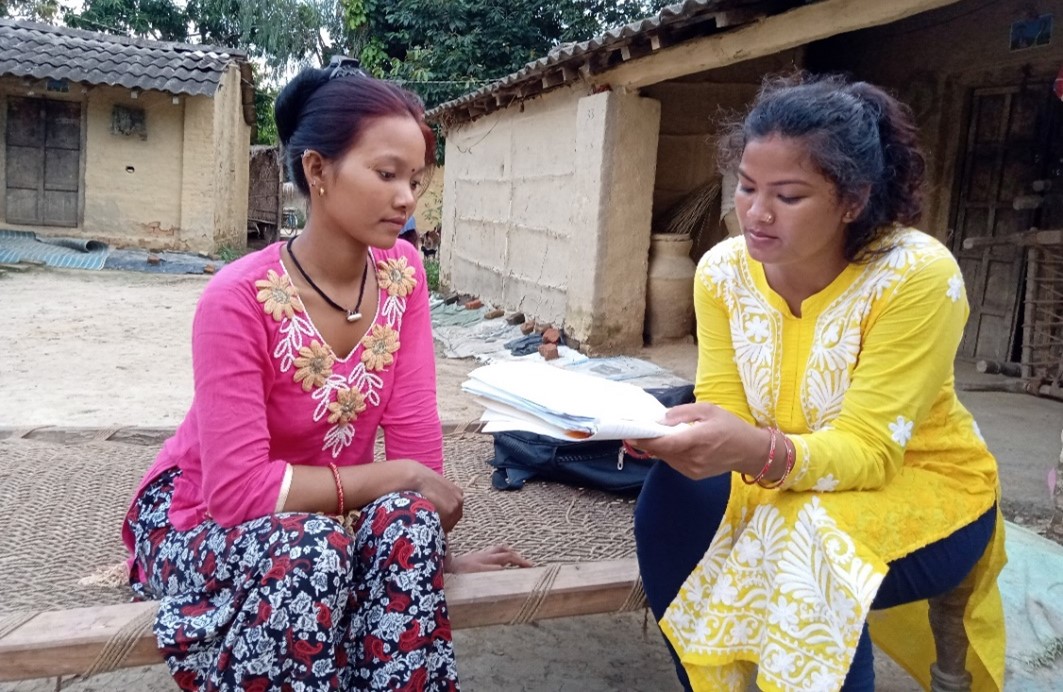
Maghe Sankranti 2021
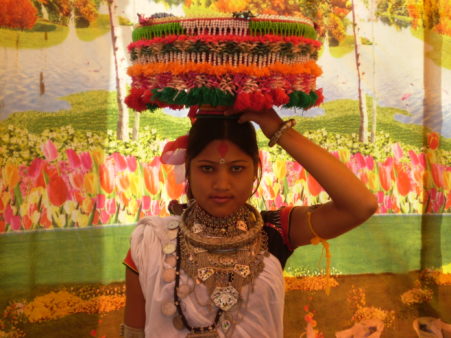
(Above, Jamuna Tharu, a Freed Kamlari and social motivator, prepares to celebrate Maghe Sankranti in 2009.)
Maghe Sankranti – The Tharu people in Nepal’s Terai region celebrate their New Year on Maghe Sankranti, which falls in mid-January. In 2021, that day was January 14th. Happy New Year!
For generations, this auspicious day had a grim meaning for young Tharu girls. Maghe Sankranti was the day the year’s debts came due. On this day, many families settled their debts in the only way available to them: by bonding their young daughters for a year of indentured servitude in the homes of strangers in Nepal’s urban areas. For these girls, some as young as five or six years old, “Happy New Year” meant goodbye to the safety of home—and a frightening journey to a life of kitchen slavery, dehumanization, and abuse. Bonded girls were known as kamlari.
But now, the girls freed from this practice are grown up and ensuring freedom and justice for their sisters. As the Freed Kamlari celebrate Maghe Sankranti this year, they are celebrating hard-won victories built over the past 20 years—including the certainty that the daughters of their minority ethnic group will never again be bonded away.
NYF began fighting the kamlari practice in 2000, with Som Paneru, Olga Murray, and Man Bahadur Chettri leading the way in developing long-term, targeted programming designed to free, heal, educate, and empower the individual girls and to challenge Nepal’s government to eradicate the practice once and for all.
Nepal’s government made the kamlari practice illegal in 2013.
In 2020, we published a three-part series celebrating the Empowering Freed Kamlari program’s transition to Tharu control, the rising leaders of the Kamlari Movement, and the ways the Freed Kamlari Development Forum is providing community support during COVID-19.
Today, NYF is proud to share another resource with the NYF Family: an in-depth study on the impact of our 20-year efforts to empower young women impacted by the kamlari practice.
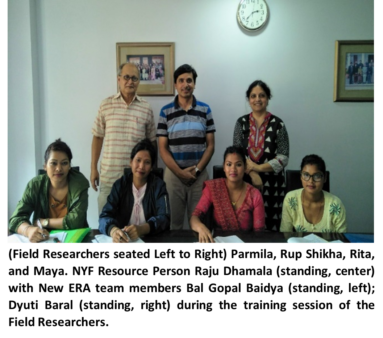
Click here to download the full independent study!
This study was conducted by an independent group of field researchers in 2019. They interviewed a sample of the women freed from the kamlari practice through NYF’s efforts, focusing their questions on topics linked to NYF’s mission: health, shelter, education, and freedom/empowerment.
During the 20-year Empowering Freed Kamlari program, NYF rescued 12,932 girls from domestic bondage. At NYF, we try to focus on individual stories as much as possible. But what about the other thousands of individuals served? If you’re interested in statistics about the broader impacts of our work, please read on!
We’re proud to report that the findings were incredibly positive! In almost all cases, the Freed Kamlaris and their families were not only doing better than they had before NYF intervened—they were doing better than national averages!
Here are just a few highlights:
Health
Other than offering mental health services through Ankur Counseling Center, the Empowering Freed Kamlaris program was not focused on health or health services. But researchers were surprised to discover the ripple effects of NYF’s focus on education.
Women impacted by the Empowering Freed Kamlaris program report much higher than average access to health education and resources for themselves and their families. For example…
Freed Kamlaris are having fewer children than their mothers did—an average of 1.5, which is lower than the national average. They report using family planning methods to ensure their families don’t grow larger than they can support.
Of the Freed Kamlaris with children, 88.7% delivered their last child in a healthcare facility, 97.2% had at least one prenatal checkup, and 82.4% had four or more prenatal checkups. A whopping 93.4% had had all of their children fully immunized as recommended for their age. All of them had had their children at least partially immunized.
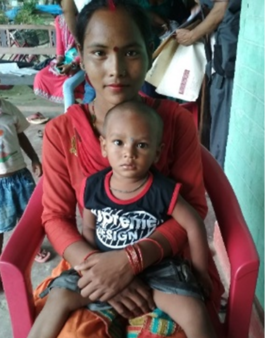
(Above, a 20-year-old married Freed Kamlari shows off her one-year-old son during her interview.)
Shelter
Extreme poverty was the main reason families reported for bonding their girls into the kamlari practice. NYF worked to ensure better economic resources for the girls we served, but home-building was not part of our programming.
Yet now, over 80% of Freed Kamlaris and their families live in homes constructed at least in part with “improved” materials. This includes at least one (and often a combination) of materials like galvanized sheet roofing (instead of thatch), cement or stone flooring (instead of earth), and brick or cement walls (instead of mud or bamboo).
Additionally, 90% of these families have access to sanitation facilities (plumbing) within their homes. Of the 9.5% using outhouses instead, many reported that this was intentional. Such facilities inside the home can be considered “polluting” for religious and cultural reasons, and many of the Freed Kamlaris rescued in early years reported that being forced to clean modern toilets was among their most demeaning experiences as kamlari.
When asked about their household’s main source of energy for lighting, 91.3% used electricity—a high proportion, indicating relative affluence. But 6.5% of the Freed Kamlaris surprised the researchers by reporting their use of solar panels! Off-the-grid energy sources were so unexpected, they had to be added to the list of options on field researcher questionnaires.
Improved housing is one of many ways these empowered women have leveraged their education and economic power to better their own lives.
Education
Education was a primary focus of NYF’s Empowering Freed Kamlari efforts from the very beginning. The earliest girls rescued returned home because NYF promised their families a piglet or goat in exchange for their daughters’ freedom to live at home and attend school.
The response was so strong that classrooms in the Terai region of Nepal were soon overwhelmed with too many students. Some in local government complained that NYF was causing problems for the school system! NYF responded by building 61 additional classrooms between 2004 and 2014 as well as ensuring schools had access to sufficient trained teachers, toilets, drinking water tanks, and furniture.
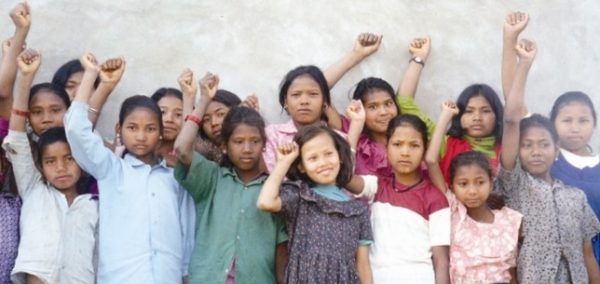
(Above, a group of newly-freed Tharu girls prepare to enter school in 2003.)
NYF also established and ran “catch up” classes to help young girls deprived of early education during their kamlari years. These courses ensured students could succeed alongside classmates close to their own age, instead of forcing teenagers to attend school with kindergarteners.
Now, Nepal’s national literacy rate stands at 67%. Among Freed Kamlaris, literacy is at 97%.
The average Nepalese adult today has completed 4.9 years of education. Among Freed Kamlaris, the average is 8 years—and rising, as 22.4% of Freed Kamlaris are still in school! About 30% of these women have completed grade 10 (the rough equivalent of finishing high school in the US).
Nearly two-thirds of the parents of Freed Kamlaris—61%!—had begun sending their sons to school once they saw their daughters going.
About one in three Freed Kamlaris have completed a vocational training course or received technical education in a field like engineering, computer technology, health care, dressmaking, poultry farming, or screen printing.
Around 4,000 Freed Kamlaris have received additional training through NYF in community leadership, cooperative management, organizational development, and entrepreneurship.
Just under 90% of Freed Kamlaris named educational opportunity as a way their rescue had improved their lives.
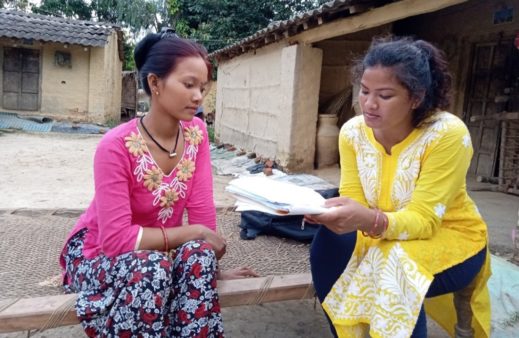
(Above, a Freed Kamlari, in pink, tells a field researcher about life since her rescue. All of the field researchers were women fluent in the Tharu language.)
Freedom
In many cases, freedom comes from education and economic empowerment.
Family members of the Freed Kamlaris reported that 92.3% of these women are currently contributing to household expenses (and remember, this includes the 22.4% who are attending school!). A similar number—91.1%—said that their family’s economic condition had improved in the last 10 years.
These families say the economic improvement came from their newfound ability to buy their own farmland or rent a larger area of sharecropped land, from the ability to start small businesses, or because of the employment of a family member.
About 29% of Freed Kamlaris are either employed or own a nontraditional business, including nontraditional crops like henna and mushrooms. This may seem like a low number, but the Tharu people are primarily a culture of farmers—so 29% is an enormous uptick!
Those Freed Kamlaris who have chosen to continue following the agricultural path are reporting huge advances as well. A full 75.1% of their families grow enough food to make their families entirely or almost entirely self-sufficient year-round through farming alone—an enormous blessing in tough economic times like the world is experiencing now.
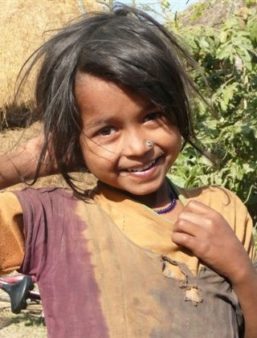
(Above, a young Tharu girl grins at the camera. Taken during the early years of NYF’s involvement with the Tharu people, this photo captures a moment very soon after this child’s return from her time as a kamlari.)
But freedom is also an internal experience—confidence in oneself and the ability to make decisions.
Researchers asked Freed Kamlaris whether they were allowed to make decisions in important areas of their lives: what age to marry, who to marry, whether or not to attend school, subjects to study in school, what career or job to pursue, and how to spend one’s earnings.
The area of least empowerment was what age to marry—90% of Freed Kamlaris were empowered to choose when to marry. (A main focus for the Freed Kamlari Development Forum is combatting early marriage in the region.)
When asked about subjects to study in school, 100% of these remarkable women reported they were empowered to make their own choices.
Freed Kamlaris were also found to have a high level of self-confidence that surprised the Nepalese researchers. These women were much more confident in themselves and their futures than the average Nepalese adult! The researchers also noted that this high confidence went hand-in-hand with grounded, realistic thinking.
A full 84.5% of Freed Kamlaris believed that their lives would improve over the next 5 years—and none believed they would be worse off.
Over 2/3 believed they would be able to take better care of their families in 5 years, and 54.7% saw themselves becoming more self-confident during the same time.
Ten percent of Freed Kamlaris hold leadership positions in community groups, and 21.5% are involved in social activism focused on the kamlari movement, ending violence against women, and ending early child marriage.
At NYF, we have so much to celebrate this Maghe Sankranti!
Thank you to every NYF donor for each thoughtful gift you have invested into these women and girls over the past 20 years. Your love—offered in the form of piglets, scholarships, start-up funds, vocational training, word-of-mouth, and so much more—have built opportunities and strength for a generation of young women. Dhanyabad! We are so grateful for your belief in these girls.
Now, 20 years after Som and Olga learned of the kamlari practice in Western Nepal, the journey continues for these incredible women as they step forward with new independence. The program’s valuable work is being carried forward with strength by the Freed Kamlari Development Forum—a Terai-based nonprofit led by the Freed Kamlaris themselves.
At NYF, we’re excited to step forward as well, putting 20 years of expertise to good use helping empower women and girls through new and continuing programming! We’re using the lessons learned over 20 years to continue serving communities of children throughout Nepal, ensuring their access to Health, Freedom, Shelter, and Education.
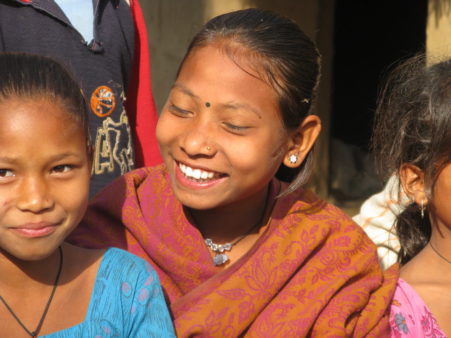
A freed girl grins in a bright moment during a 2009 celebration of the Freed Kamlari movement’s progress. Nepal would not make the practice illegal until 2013, but this girl knew the future was bright and change was on the horizon.
One Day’s Wages Partners with Nepal Youth Foundation for Scholarships
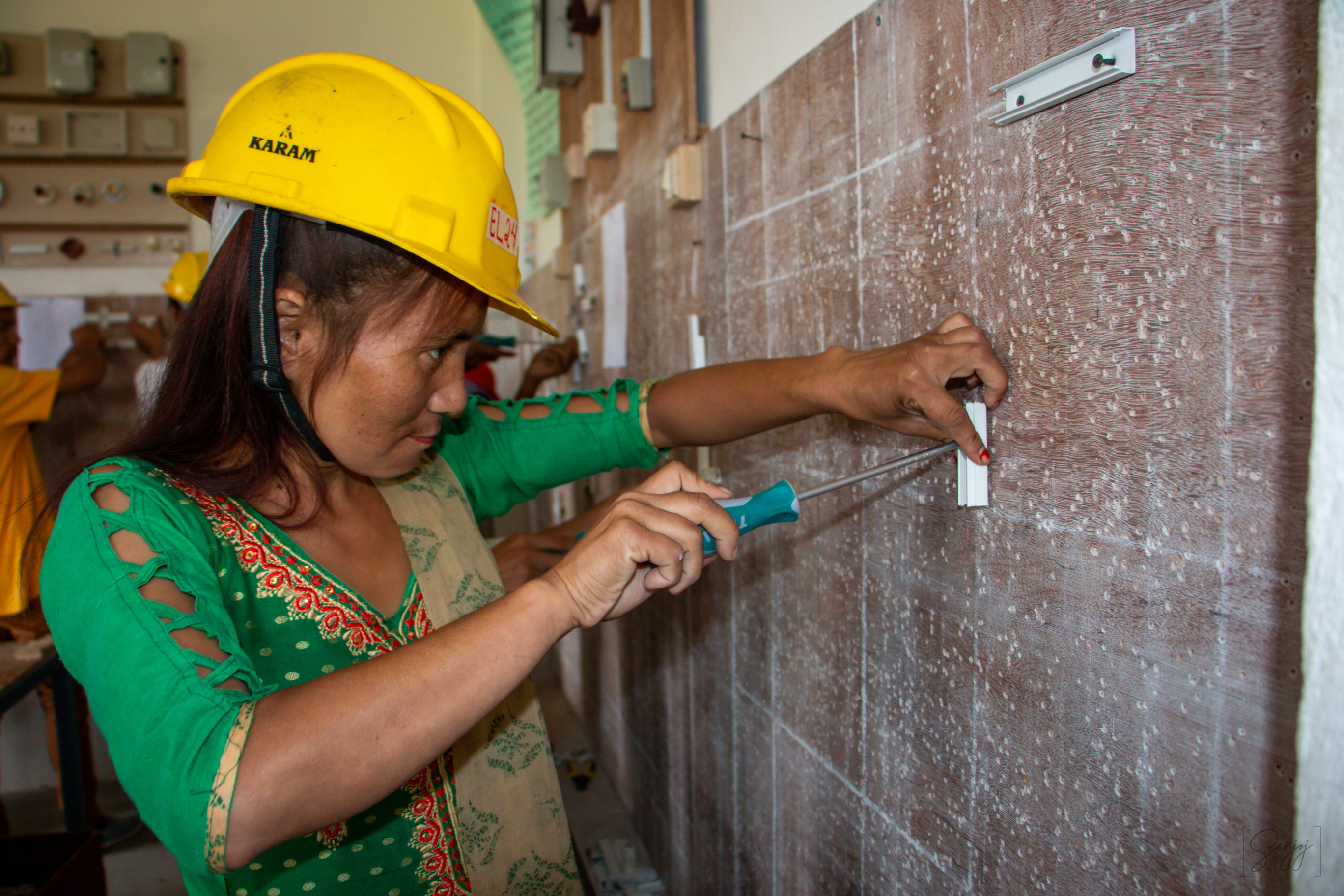
One Day’s Wages and NYF, Doubling Your Gift
Nepal Youth Foundation (NYF) is excited to partner with One Day’s Wages to provide vocational training for young men and women in Nepal – keeping families together and helping to end the cycle of poverty in one of the poorest countries in the world.
This partnership will provide 40 Scholarships at Olgapuri Vocational School for high- demand skills trainings in electrical and plumbing. In addition to providing free training, NYF staff will help students become job-ready (through aptitude assessment and career counseling) and secure employment after graduation.
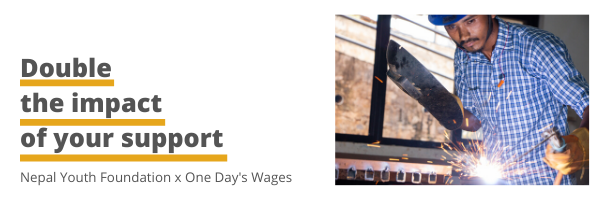
With over 40% of the population living on less than $3.50 a day in Nepal, economic desperation traps many families in generations of poverty. The majority of students don’t make it past the 10th grade, and the unemployment rate is high even for college graduates. Often young Nepalese end up leaving their families and villages for work as cheap construction or domestic laborers in the Persian Gulf and India. They’re vulnerable to being exploited or worse – of the estimated 500,000 migrating to work abroad in 2015, one out of every 500 died in dangerous working conditions.
Ironically, Nepal is in desperate need for skilled labor, especially in the construction trades after the 2015 earthquakes destroyed much of the country. With the government’s latest national plan emphasizing economic growth through advancements in modern industry and infrastructure, opportunities in the skilled trades are growing.
Vocational Education provides the skills for gainful employment – and sustainably builds the country, while keeping families together.
Give through the One Day’s Wages website and they’ll double your donation!
Your generosity will help to train Nepalese youth for new careers in electrical and plumbing trades—bright, capable young people like Sarita and Arjun.
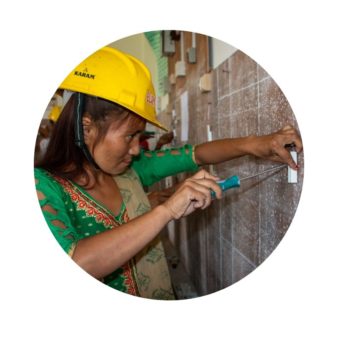
Sarita T.
When Sarita was just a child, her father left her mother with 8 children to raise on subsistence farming.
Though Sarita studied hard and completed high school, she wanted a good job to help her younger siblings stay in school. With an NYF scholarship, she entered the electrician training program at Olgapuri Vocational School (OVS).
While female electricians are still rare in Nepal, Sarita is enthusiastic about the well-paid jobs available in the field.
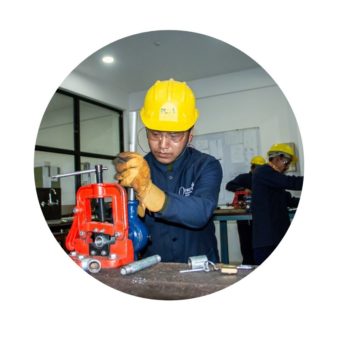
Arjun L.
Arjun is from a mountainous region in Nepal where only about 12% of youth complete high school. At 29 years old, Arjun was struggling to provide for seven people.
After a recent graduate of OVS returned to their village, Arjun decided to enroll in the plumbing course.
Arjun is excited about his new career choice, which will enable him to provide for his family.